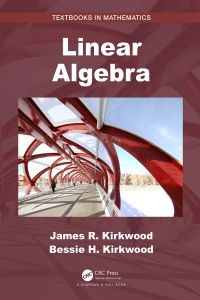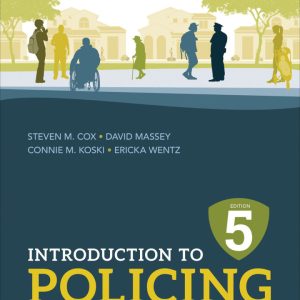Buy Linear Algebra
1st Edition PDF ebook by author James R. Kirkwood; Bessie H. Kirkwood – published by Chapman & Hall in 2021 and save up to 80% compared to the print version of this textbook. With PDF version of this textbook, not only save you money, you can also highlight, add text, underline add post-it notes, bookmarks to pages, instantly search for the major terms or chapter titles, etc.
You can search our site for other versions of the Linear Algebra
1st Edition PDF ebook. You can also search for others PDF ebooks from publisher Chapman & Hall, as well as from your favorite authors. We have thousands of online textbooks and course materials (mostly in PDF) that you can download immediately after purchase.
Note: e-textBooks do not come with access codes, CDs/DVDs, workbooks, and other supplemental items.
eBook Details:
Full title: Linear Algebra
1st Edition
Edition: 1st
Copyright year: 2021
Publisher: Chapman & Hall
Author: James R. Kirkwood; Bessie H. Kirkwood
ISBN: 9780367569020, 9781498776875
Format: PDF
Description of Linear Algebra
1st Edition:
Linear Algebra, James R. Kirkwood and Bessie H. Kirkwood, 978-1-4987-7685-1, K29751 Shelving Guide: Mathematics This text has a major focus on demonstrating facts and techniques of linear systems that will be invaluable in higher mathematics and related fields. A linear algebra course has two major audiences that it must satisfy. It provides an important theoretical and computational tool for nearly every discipline that uses mathematics. It also provides an introduction to abstract mathematics. This book has two parts. Chapters 1-7 are written as an introduction. Two primary goals of these chapters are to enable students to become adept at computations and to develop an understanding of the theory of basic topics including linear transformations. Important applications are presented. Part two, which consists of Chapters 8-14, is at a higher level. It includes topics not usually taught in a first course, such as a detailed justification of the Jordan canonical form, properties of the determinant derived from axioms, the Perron-Frobenius theorem and bilinear and quadratic forms. Though users will want to make use of technology for many of the computations, topics are explained in the text in a way that will enable students to do these computations by hand if that is desired. Key features include: Chapters 1-7 may be used for a first course relying on applications Chapters 8-14 offer a more advanced, theoretical course Definitions are highlighted throughout MATLAB and R Project tutorials in the appendices Exercises span a range from simple computations to fairly direct abstract exercises Historical notes motivate the presentation About the Authors James R. Kirkwood holds a PhD from the University of Virginia. He has had over a dozen mathematics textbooks published on various topics including calculus, real analysis, mathematical biology, and mathematical physics. His original research was in mathematical physics, and he co-authored the seminal paper in a topic now called Kirkwood-Thomas Theory in mathematical physics. He has been awarded several National Science Foundation grants. Bessie H. Kirkwood holds PhDs in both mathematics and statistics. She co-authored papers in publications such as the Journal of Algebra and the Journal of Multivariate Analysis. Until retirement, she was a professor of mathematics at Sweet Briar College.





